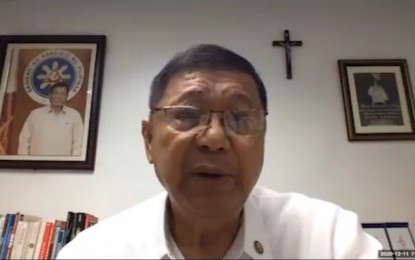
Philippine Sports Commission Chairman William “Butch” Ramirez (Screenshot)
MANILA – The coronavirus disease 2019 (Covid-19) pandemic also hit Philippine sports so hard that even its governing body, the Philippine Sports Commission (PSC), had to give way.
The PSC had to reallocate some of its funds for 2020, primarily its financial help for the supposed holding of the Asean Para Games that eventually led to its cancellation, and half of the national athletes’ and coaches' supposed allowances – almost PHP1.37 billion – to the country's fight against Covid-19 when Luzon was placed under lockdown.
The commission also let the government use its three main indoor arenas – the Rizal Memorial Coliseum and the Ninoy Aquino Stadium here and the PhilSports Arena in Pasig – as quarantine facilities for those affected by the virus, further stalling the athletes' training.
However, as the restrictions began to ease up, the PSC recovered as well, and thanks to the Bayanihan to Recover as One Act, it eventually got to pay the Nationals back in full.
"Nagawa na namin ito noong November (We did this last November)," Malyn Bamba, PSC's public communications office chief, said, implying that by that time, everyone got his or her allowance back in full.
The PSC began making up to the athletes financially in October.
Bamba added that the two legislative chambers also approved a move to give the national athletes an extra PHP5,000 each as part of the Social Amelioration Program.
The PSC also conducted webinars to catch up with the national athletes, especially those who have already clinched a spot in next year's Tokyo Olympics, to assure them of the agency's support and morale boost.
On the other hand, the commission also provided awareness to everyone about indigenous sports through an online forum and held an information drive about women empowerment in sports.
It helped in slowly putting Philippine sports back amid the pandemic by collaborating with the Department of Health for the joint administrative order (JAO) in the resumption of professional sports events with the Games and Amusements Board and the collegiate sports activities with the Commission on Higher Education.
The fullness of the JAO in collegiate sports may be felt by April should the National Collegiate Athletic Association (NCAA) push through with its long-postponed 96th season.
Meanwhile, Bamba also announced that all those inside the PSC-owned arenas for quarantine recovered from Covid-19 and were later sent home.
The PSC also handed out help in other aspects, such as care packages for the youth and families of nearby communities and financial assistance to the athletes who were affected by typhoons Rolly and Ulysses that hit the country in November.
Its biggest achievement though was the enactment of the National Academy for Sports Law.
While the National Academy for Sports will be mainly under the Department of Education, the PSC will also have a hand in molding the student-athletes training-wise.
Despite the stalled training of national athletes, PSC chairman William “Butch” Ramirez remains optimistic that the Filipino athletes would win medals in the Tokyo Olympics that was reset to July 23 to August 8 next year due to Covid-19.
“Hindi namin pinapabayaan ang ating mga athletes at ako naniniwala sa kanilang kakayahan (We are not forgetting our athletes and I believe in their capabilities),” he said in a recent virtual presser.
Boxers Eumir Marcial and Irish Magno, gymnast Carlos Yulo, and pole vaulter EJ Obiena have already qualified for the Tokyo quadrennial meet.
Ramirez said the prospect of winning the country’s first-ever Olympic gold medal in Tokyo remains bright despite the pandemic.
“This pandemic, it might give them more morale boost to achieve their dreams. This must be (an) opportunity for them to perform and excel. In crisis, an excellent athlete can control himself or herself. He can control the challenge,” he added.
Ramirez said the national athletes could resume “normal” practice if all the health and safety protocols are followed to protect them from the virus.
“There are people who will be monitoring because we have to be very strict because if only one athlete will be infected, we have to stop the training. We will not allow a training venue without a doctor,” he said.
Ramirez noted that the PSC is working on inoculating all the national athletes once the Covid-19 vaccines become available in early 2021.
He thanked all the lawmakers who took initiatives to include necessary funding under the 2021 General Appropriation Act for the training of the athletes for next year’s Olympics and Southeast Asian Games in Vietnam. (PNA)
